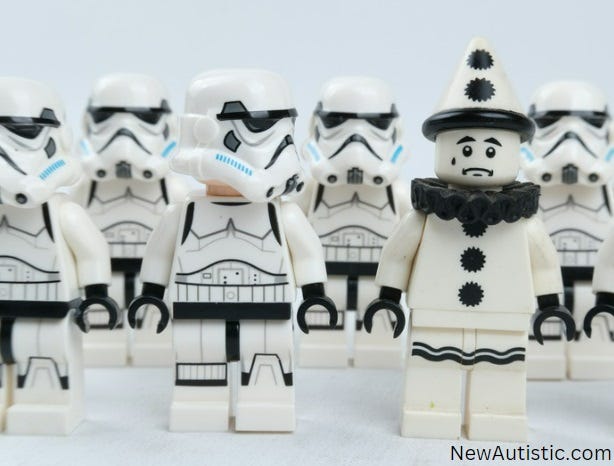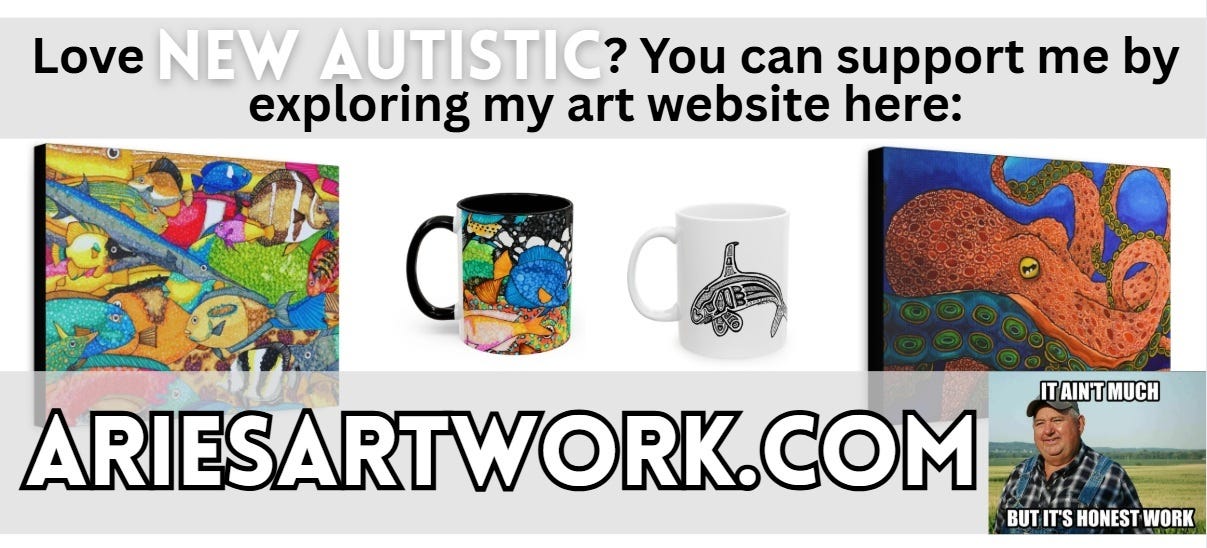Feeling Different: Growing Up as an Undiagnosed Autistic
Unmasking Autism in Adulthood
I remember always feeling "different" — whatever that meant. Some of my earliest memories are those of me in daycare or pre-kindergarten. While other children laughed and played and chased one another, I often could be found with my nimble fingers grasping at the rough, salt-crusted chain link fence that overlooked the I-5 freeway in Southern California. I would watch the cars go by for what felt like hours, and in many cases, it probably was.
That's not to say that I never interacted with the other children, because I did, but usually only with one or two that I really liked or got on with. Being in larger groups was difficult for me because I couldn't keep track of what everyone was saying or doing, and then I'd end up feeling overwhelmed and shut down or meltdown. I'd get frustrated at the overwhelming stimulation coming at me from all directions: voices, people, lights, sounds, smells.
Most of all, I'd get frustrated at myself.
If everyone else could manage this somehow, why couldn't I? I must be stupid or inept, I thought, or just plain weird. Maybe I was crazy. I just had to try harder. I just had to work harder.
Growing Pains
This same pattern repeated itself often through my formative years, through middle school, high school, and onto college and beyond. Because I have no intellectual disabilities and always earned excellent grades in school, I was able to make friends in certain situations, but in the vast majority of social situations, I was viewed as weird, strange, or odd. I was the one on my sports teams who was never asked to hang out outside of practice. I wasn't invited to parties or get-togethers, except very rarely, and typically I had to use alcohol in those situations in order to feel "normal" — whatever that meant.
Most of all, I've always felt like there's been a fundamental disconnect between myself and (what often seems like) the rest of the human race. This is apparently a common feeling amongst autistic people in general, and especially those who went undiagnosed until they were adults. I've read that many people describe it as feeling like an alien, like you don't belong, or having an overwhelming sense of otherness.
Looking for Solutions
Like many people, I tried numerous forms of therapy and medications over the years. Some was helpful, but most wasn't. What worked for most people didn't work for me. Litanies of tests were run for many of my unexplainable physical ailments, including migraines, light sensitivities, stress sensitivities, temporomandibular joint (TMJ) dysfunction, digestion issues, and chronic pain among others. It was eventually ruled, in more words and by many different doctors, that it was "all in my head."
I thought I was crazy. I had to be crazy.
Everyone in my life was telling me that I was too sensitive, that I just needed to try harder, or that I was just being selfish or lazy. Even the doctors were telling me that it was all in my head, so clearly, I had to be the problem!
Learning About Autism
In my early 30s and for unrelated reasons, I was doing research into attention deficit hyperactivity disorder (ADHD). I didn't identify with most of the ADHD traits that I was reading about, but I did read that ADHD is often comorbid or found together with autism.
So, I started reading about autism. What was once a fleeting curiosity soon became an obsession (which I now know isn't uncommon among autistics). I was watching autistic creators on YouTube, listening to psychologists lecture about autism, delving into studies on the causes and potential treatments for autism, how autism presents itself differently in men and women, the various levels of autism (which I'd never heard of before), and far more than I could ever hope to include in one blog post.
I was so intrigued by autism because it was the first time in my life that I had felt seen, heard, and understood. These autistic people were talking about all of the things that I had experienced — things other people had told me I was crazy for experiencing. Common refrains I heard throughout life include: "No one feels like that," "No one thinks like that," or "No one does that."
But I did.
I've come to learn and understand that it's actually completely normal for an autistic person to be sensitive to certain stimuli, to have social compatibility issues, and to have otherwise unexplainable medical issues. (Please note that this is only the smallest tip of the iceberg when it comes to experiences that some autistic people have, and is not at all an exhaustive list of my own symptoms.)
Seeing the Light
When you learn that your sense of fundamental difference from most other people is actually real, and you're not crazy, and it's not all in your head...
It's liberating.
At once, almost everything suddenly makes sense. You replay situations in your head, looking at them through the lens of autism, and you realize that you weren't actually a weird person; you were just an autistic person trying to make it work in a world not meant for you.
Those social faux pas that you ruminated on over and over again, trying to determine what you might've done better or could've otherwise said, actually happened because you were an autistic person trying to communicate in the best way you knew how. It didn't work out, but it wasn't that you'd intended to be mean or rude; you were truly trying your best, and your best often wasn't good enough. All of the scripting of dialogues that never end in your head may seem strange to a "normal" person, but it's quite common for many autistics.
I could go on for a long while about such topics, and I'm sure I will in future blog posts, but the purpose of this one is to say that getting diagnosed with autism has been a life-changing event. Whereas I didn't have any explanations before — aside from the suggestion that I was crazy — I now have answers, understanding, and most of all, a much more empathetic lens through which to view myself.
Autism has given me permission to be kinder to myself, something even I didn't realize I sorely needed.
Thanks for Reading!
Thanks for taking time out of your busy day to spend some time with me! I encourage all of my readers to RISE (Reflect, Improve, Strengthen, & Evolve) with me because healing is a lifelong journey — it’s not always easy, but it’s always worth it. You are loved, cherished, and valued. Don’t ever let anyone ever convince you otherwise.
My commitment to bringing you FREE, well-researched, and comprehensive content means I spend considerable time and effort writing each article or post without compensation.
Want to Support Me?
The simplest FREE way you can support me is by subscribing, sharing, or leaving a comment:
I believe in keeping my content accessible to everyone, without paywalls, because I know the work I do matters. For that reason, I’m beyond grateful for any financial support! If you'd like to support me and my work, check out my art website at AriesArtwork.com to bring home something unique or find a gift for that special someone in your life:
I’ll see you again when I’ve got a new info-dump for you, my Newtistics Crew!
—Skylar Aries








